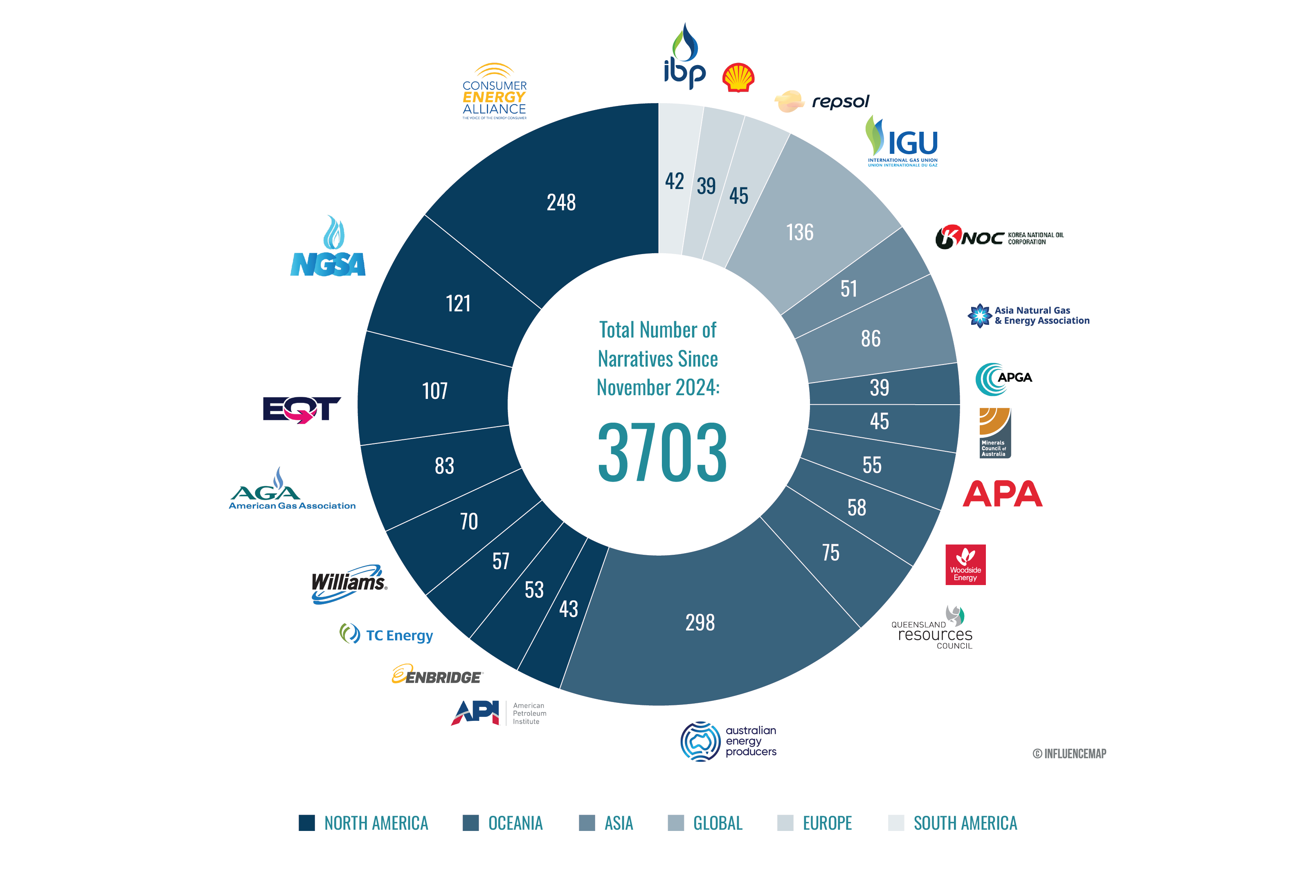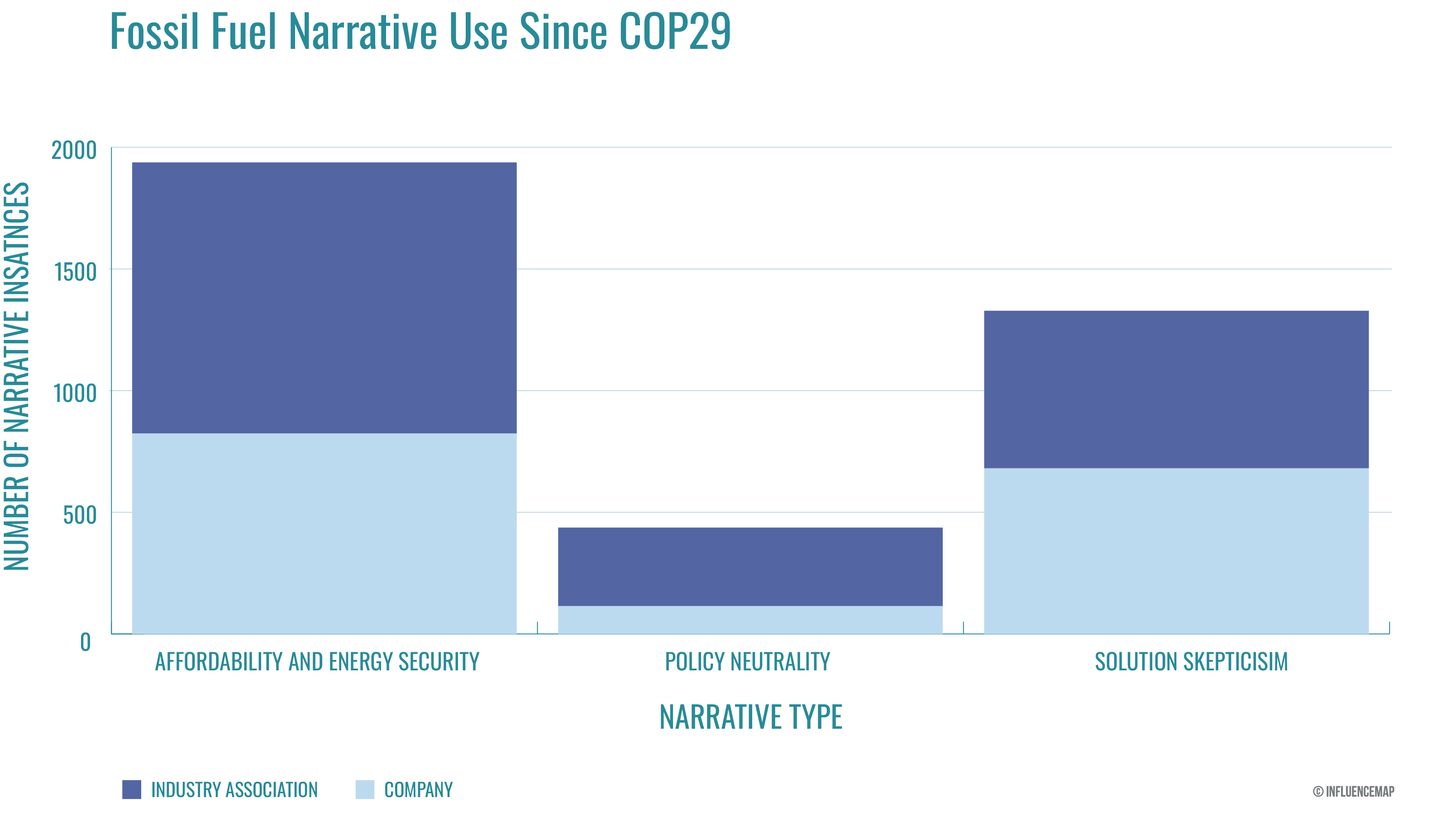Persistent, global use of anti-transition narratives: Since COP29 in November 2024, InfluenceMap has found that the use of pro-fossil fuel narratives has increased by a third, with over 3,700 instances of pro-fossil fuel messaging logged from more than 200 companies and associations. These narratives remain misaligned with Intergovernmental Panel on Climate Change (IPCC) pathways to 1.5°C.
Growth in affordability and energy security arguments: In the last year, narratives that amplify fears over energy affordability and security have outgrown arguments around solution skepticism as the fossil fuel industry’s primary narrative, capitalizing on the political moment to falsely argue that fossil fuels are a necessary part of the future energy mix.
Continued influence on global climate negotiations: Despite the global community making commitments to speed up the transition away from fossil fuels at COP28, more than 50 of the 200 entities identified in the analysis as actively promoting misleading narratives on the energy transition were at COP29, raising concerns that fossil fuel influence continues to undermine progress during the talks.
Narrative use is concentrated among a small group: Since November 2024, just 20 fossil fuel companies and industry associations, mostly headquartered in North America and Oceania, have accounted for 47% of all fossil fuel narrative activity.
InfluenceMap’s LobbyMap platform track's the climate policy engagement of over 1000 companies and 330 industry associations, including identifying recurring narratives used by companies and industry associations in the fossil fuel value chain tin their advocacy on the energy transition. These pro-fossil fuel narratives commonly emphasize themes such as “energy security and affordability,” “technology neutrality,” or exaggerate issues associated with renewable energy.
Pro-fossil fuel narratives have proliferated from fossil-linked corporate communication channels, likely in response to COP28 (November 2023) commitments to transition away from fossil fuels and expand renewable energy capacity. Last year, InfluenceMap’s analysis of pro-fossil fuel narrative use during the year preceding COP29 (Baku, November 2024) found over 2,400 instances of narrative use promoted by more than 100 fossil fuel companies and industry associations. This year, InfluenceMap identified over 3,700 instances of fossil fuel narratives from over 200 fossil fuel companies and associations since November 2024. Analysis of the entities included in last year’s analysis found an average increase of 37% in the amount of narratives used by each entity.
Over a quarter (26%) of the fossil fuel companies and associations promoting these narratives attended COP29 and are expected to attend COP30. In an October 2025 letter, over 225 organizations raised concerns opposing the presence of pro-fossil fuel entities at the conference, warning that corporate influence risks undermining the credibility of climate negotiations at COP.
Industry associations continue to deploy these narratives more intensively than individual companies. This indicates that associations remain the primary vehicles through which the fossil fuel industry coordinates and amplifies messaging that undermines climate policy. Two-thirds (64.5%) of total narrative instances came from either CEO messaging or direct engagement with policymakers, showing that these narratives are not incidental PR but deliberate, high-level strategies aimed at shaping the policy environment.
The graphic below illustrates the narrative frequency of the top 20 narrative users. Advocacy around these narratives is dominated by a relatively small group of fossil fuel companies and industry associations, particularly from North America and Oceania (predominantly Australia). Overall, the top 20 users account for 45% of all fossil fuel narrative use since November 2024. The top three narrative users in the past 12 months are all industry associations: the Australian Energy Producers, the Consumer Energy Alliance, and the International Gas Union.

Top 20 Companies and Industry Associations by Total Use of Anti-Transition Narratives (Nov 2024–Oct 2025).
This updated assessment expands on InfluenceMap’s July 2024 report on the “Fossil Fuel Narrative Playbook,” which identified three broad narrative categories commonly used to oppose, weaken, or delay the energy transition. These categories remain central to industry communications in the lead-up to COP30:
Affordability and Energy Security: stresses the economic concerns of moving away from fossil fuels while placing fossil fuels central to both energy security and energy affordability.
Solution Skepticism: downplays the viability of alternative energy sources to fossil fuels and the negative impacts associated with fossil fuel use.
Policy Neutrality: calls for technology-neutral policy and is unsupportive of government intervention, instead preferring market-based solutions while stressing the need to protect consumer choice.
InfluenceMap determined that each of these narratives is misaligned with science-aligned policy pathways set out by the IPCC.
Analysis shows that the themes of “Affordability and Energy Security” and “Solution Skepticism” continue to appear most frequently, with 1,938 instances of “Affordability and Energy Security” narratives and 1,328 instances of “Solution Skepticism” narratives logged in the LobbyMap database since COP29. While these two themes were recorded at similar levels last year (1,110 and 1,028 instances respectively), this cycle has seen a marked acceleration in “Affordability and Energy Security” messaging, placing it significantly ahead of all other narrative categories. The “Policy Neutrality” narrative, while appearing less frequently, also continues to feature prominently, with 437 recorded instances across corporate and industry advocacy.

Distribution of narratives by category, including the share of use from companies and industry associations
This platform update highlights that, despite growing international consensus on the need to phase out fossil fuels, the same set of actors continues to promote narratives that obstruct progress, underscoring the need for sustained scrutiny and pressure to revoke their social license to influence climate policy globally.
More information on the use of pro-fossil fuel narratives can be found in the report download.
Note: While constantly expanding, InfluenceMap’s coverage is most comprehensive in North America, Europe, Asia, and Oceania. Due to differences in transparency and disclosure practices, these regions may appear more prominently in the data, while other regions may be underrepresented.